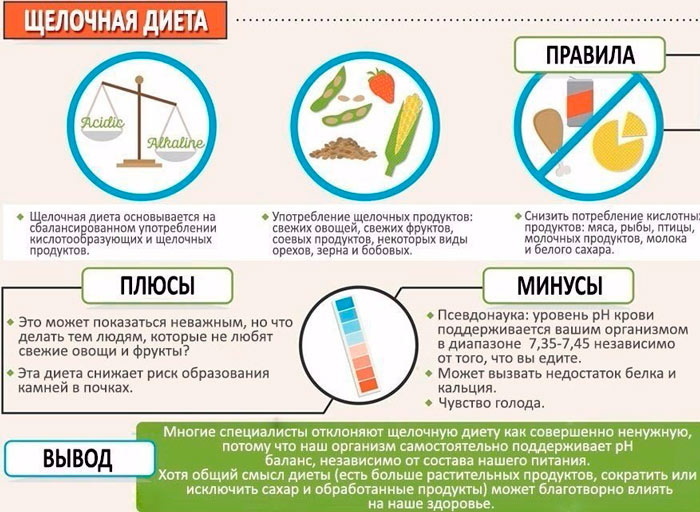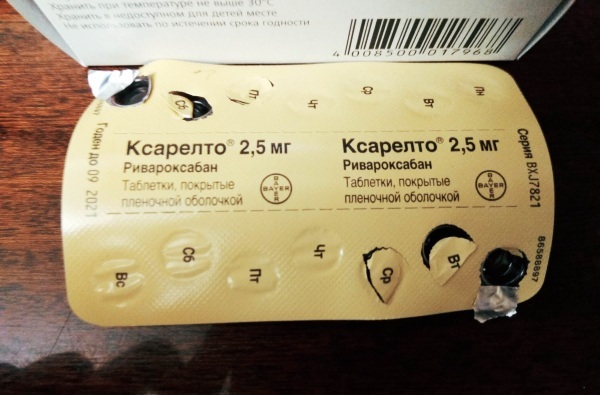Drugs used to accelerate blood clotting, help to significantly reduce blood loss and prevent the development of complications as a result of heavy bleeding against the background of severe injuries and some other diseases.
The funds have a pronounced effect on the body, so it is important to use them only as directed by a doctor and follow all recommendations exactly.
Record content:
- 1 Principle and mechanism of action of drugs for blood coagulation
- 2 Indications for use
- 3 Contraindications
- 4 Side effects
- 5 Overdose
- 6 Precautions and special instructions
-
7 The best drugs in the group
- 7.1 Pills
- 7.2 Solutions
- 7.3 Powders
- 8 What funds are suitable for use during pregnancy and hepatitis B
- 9 List of the best drugs for heavy periods
- 10 What can be used to stop nosebleeds?
- 11 Video about blood clotting drugs
Principle and mechanism of action of drugs for blood coagulation
Medicines for blood clotting are called coagulants by experts. They can be direct or indirect.
The principle of action of drugs is based on their ability to stimulate platelet adhesion and the formation of a blood clot in the area of vascular damage. Against the background of this process, bleeding stops and a small thrombus is formed at the site of the violation of the integrity of the vascular wall.
Some drugs affect not only platelets, but also clotting factors, promote their rapid formation and transportation to the site of injury. As a result, it is possible to stop the bleeding and prevent the worsening of the condition.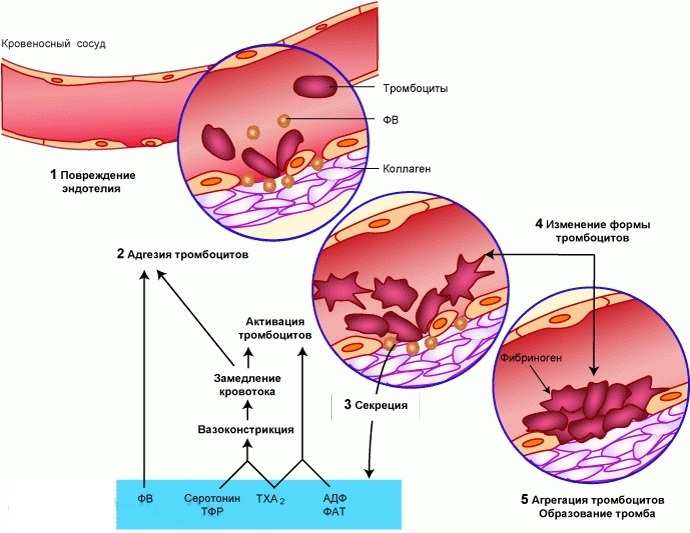
Pharmaceutical companies also offer patients drugs that do not significantly affect the factors clotting and red blood cell adhesion, but help improve vascular health, which reduces the risk of developing severe bleeding.
These medicines in most cases reduce the permeability of the vascular wall, strengthen it. Thanks to this, bleeding stops faster, especially when drugs are used in combination with other drugs that affect platelets and clotting factors.
Indications for use
Blood clotting drugs are prescribed for various conditions that are accompanied by severe bleeding and associated dangerous symptoms.
Main indications for use:
- Bleeding from soft tissues, developing against the background of gunshot, cutting or stab wounds, household injuries. At the same time, not only local, but also systemic medicines are used in the acute period of illness.
- Bleeding with open fractures with damage to large vessels and small capillaries.
- Internal bleeding, for example, gastrointestinal, which occurs when the vessels of the mucous membrane of the digestive tract are damaged. With such disorders, it is necessary to stop the bleeding within a short period of time in order to prevent complications.
- Hereditary diseases characterized by a pathological decrease in the number of platelets and coagulation factors. With hemophilia, medication may be necessary, even with minimal trauma and capillary bleeding.
- Uterine bleeding of various origins. With spontaneous miscarriage, the threat of termination of pregnancy, funds can be used for long courses.
- The recovery period after surgery on the internal organs.
- Abundant menstruation in patients with hormonal imbalance, the presence of uterine fibroids and some other diseases.
- Nosebleeds due to trauma or vascular damage as a result of a critical increase in blood pressure.
- Diagnosed thrombocytopenia, characterized by a decrease in the level of platelets in the blood.
- Bleeding from the anus against the background of hemorrhoids and the formation of anal fissures.
These and other indications are considered the reason for the use of coagulants.
Contraindications
The funds are not used for diagnosed thrombocytosis and intolerance to the components of the composition of a particular medication.
Other contraindications include the following conditions:
- The development of severe hematuria, in which there is a large amount of blood in the urine.
- Tendency to thrombosis.
- Varicose veins, thrombophlebitis and phlebitis at different stages of development.
- The period of anticoagulant therapy.
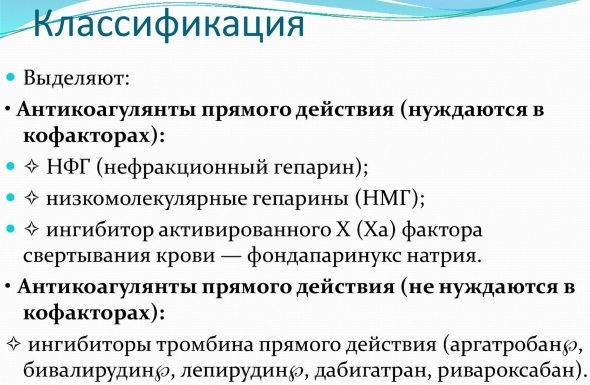
Anticoagulants are drugs that thin the blood, not clot - Acute myocardial infarction. After the disappearance of pronounced symptoms, agents can be prescribed, but only when an urgent need arises.
- Acute cerebrovascular accident. The funds are not used for hemorrhagic and ischemic stroke, as they can provoke severe complications.
- Severe kidney pathologies, accompanied by impaired organ function or failure.
- Atherosclerotic changes in blood vessels, in which there is a deposition of cholesterol plaques on their walls.
- Uncontrolled hypertension, in which there is no effect from the use of antihypertensive drugs.
Many drugs are contraindicated during lactation and pregnancy, but there are drugs that are allowed for these groups of patients. For elderly patients, medications are prescribed with extreme caution.
Side effects
Drugs can provoke negative reactions if they are used to clot blood for a long period of time and the patient does not follow the instructions. The most common complication is the formation of multiple blood clots in small and large vessels. In this case, overlap of the lumen and circulatory disorders are possible.
Many patients are worried about headache and dizziness, as well as a feeling of nasal congestion. The latter symptom is often associated with a critical increase in blood pressure. With prolonged use of drugs, an increase in the load on the heart muscle is observed, which is associated with an increase in blood viscosity.
Some patients report indigestion, frequent loose stools, and poor appetite. Side effects can affect the urinary system, which manifests itself in the form of increased urination and pain in the kidney area.
Often, the use of drugs leads to weakness, drowsiness and decreased performance. At the same time, patients note the persistence of symptoms after stopping the use of medications. Some drugs provoke severe allergies, manifested in the form of itching, rash and irritation.
Overdose
Independent uncontrolled use of coagulants will certainly provoke an overdose. With the development of such a condition, the formation of a large number of blood clots, tachycardia and hypertension is observed. In some, an overdose is accompanied by a hypertensive crisis, in which there is a severe headache, flashing of flies before the eyes.
In case of an overdose, disorders of the digestive tract and other systems may appear:
- Repeated vomiting during the day, which does not depend on food intake.
- Flatulence and bloating.
- Pain in the stomach and intestines.
- Muscle cramps.
- Violation of peripheral circulation.
In case of an overdose, an aggravation of the course of chronic diseases is additionally observed, especially in patients who have a tendency to thrombophlebitis.
Precautions and special instructions
Blood clotting drugs should only be used as directed by a doctor. It is strictly forbidden to self-medicate. If complications or symptoms of an overdose appear, you should immediately discontinue use and visit a doctor.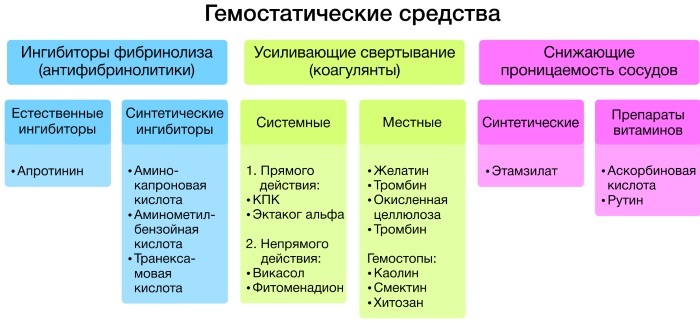
Usually, during the course of therapy, specialists take blood from the patient several times to determine the main indicators of coagulation in the form of prothrombin and the number of platelets.
If necessary, therapy is canceled if the numbers are normalized. During the period of using coagulants, it is important not to exceed the dosage and not to prolong the course on your own. This can lead to the development of complications.
The best drugs in the group
Means for stopping bleeding are available in different dosage forms, which allows you to choose the most suitable medicine in each case. Solutions and tablets are considered the most popular, but powders are sometimes prescribed for preparing solutions. Coagulants are not available in the form of drops, gels, or ointments.
Pills
Tableted medicines can be used by patients in the absence of acute symptoms. They are easy to use and highly effective when taken correctly.
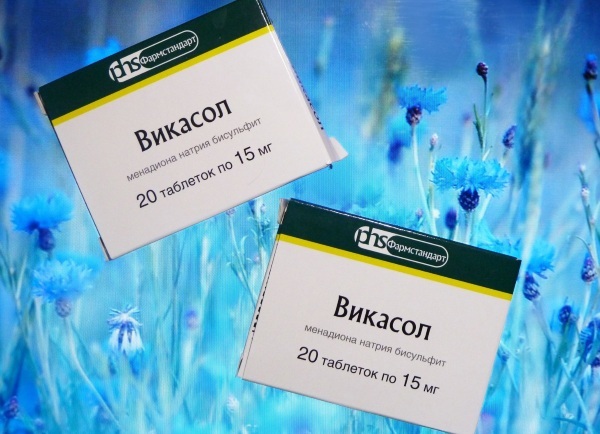
| Drug name and active ingredient | Indications for use | Application scheme and price |
| Vikasol (contains sodium menadione bisulfite) | The remedy is used for a decrease in the level of platelets in the blood, bleeding against the background of injuries and surgery, as well as for uterine bleeding, hemolytic anemia. The medication helps to stop bleeding and improve the condition. | Tablets are taken 1-2 pieces per day, depending on the profusion of bleeding and the presence of concomitant deviations. The duration of use depends on the specific disease, it can be 5-14 days, sometimes the therapy is extended to 2-6 weeks, but under strict control of blood counts. The price of the product starts from 40 rubles. |
| Tranexam (as part of tranexamic acid) | The drug is indicated for bleeding of various origins, malignant neoplasms, uterine bleeding, anemia with an increased risk of complications. The medicine is highly effective, quickly normalizes the condition. | The tablets are taken within 1-2 weeks, depending on the severity of the symptoms. The daily dosage ranges from 3-6 tablets, it must be divided into 3 doses during the day. Treatment can be prolonged, in each case its duration is individual. The price of the product starts from 500 rubles. |
| Fitomenadione (active ingredient of the same name in the composition) | It is prescribed for injuries, hemolytic anemia, bleeding against the background of pathologies of the reproductive system. | Take the remedy for 2-4 tablets per day for 10-14 days. The course can be shortened or extended if necessary, but the decision is made by the doctor. The cost of the medicine is 120-200 rubles. |
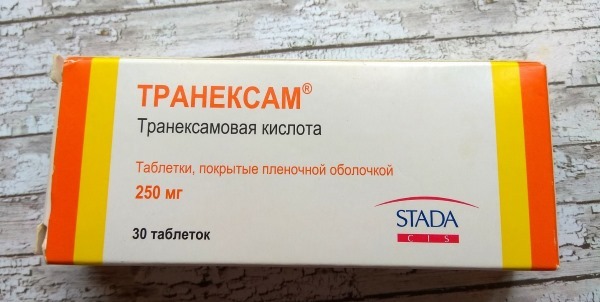
Tableted medications are prescribed when bleeding is not life threatening and does not need to be stopped immediately.
Solutions
Preparations for blood clotting in the form of solutions are prescribed in the case when the patient is not able to take pills, it is observed violation of their absorption in the body or it is required to immediately achieve a therapeutic result that oral agents are not capable of provide.
The following medications are most commonly used:
- Aminocaproic acid it is used when it is necessary to quickly stop bleeding in case of injuries, surgery or pathologies of the digestive tract with damage to the intestinal mucosa, stomach. The tool contains an active ingredient of the same name, which helps to significantly improve the condition. Per day, the patient is injected intravenously with a drop of 100 to 200 ml of the drug, the treatment usually does not last more than 7 days. The price of the medicine starts from 50 rubles. per bottle.
- Gordox contains aprotinin as the main active substance. This ingredient is of natural origin, it is used not only for bleeding, but also for damage to the pancreas. It is prescribed for pancreatitis, liver cirrhosis and some other disorders. The solution is injected at 10 ml per day using a dropper, previously adding it to 200 ml of sodium chloride. The treatment lasts at least 10 days. The price of the product is from 200 rubles. for 1 ampoule.
-
Dicinon contains etamsylate as the main active ingredient, has pronounced properties. It is prescribed for uterine bleeding, during the recovery period after surgery or severe injuries of soft tissues, internal organs. The solution is administered intramuscularly, 2 ml 3 times a day for 1-2 weeks, depending on the severity of symptoms. Its price is from 30 rubles.
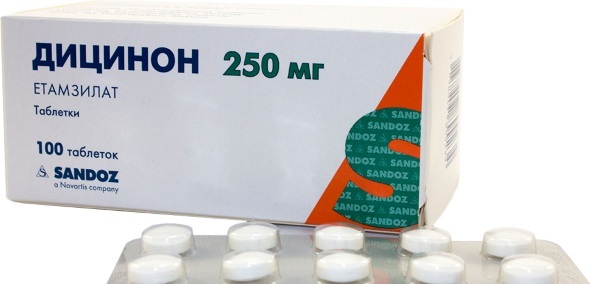
Etamsilat is a cheap analogue of Ditsynon - a hemostatic agent for heavy periods
The solutions help to quickly eliminate the symptoms of the disease, prevent serious complications against the background of profuse blood loss.
Powders
Coagulants can be produced in the form of special powders, when dissolved, you can get a solution for external use. The most popular drug in this group is thrombin. It contains an active ingredient of the same name, which has pronounced hemostatic properties.
The tool is used for bleeding during surgery, as well as capillary bleeding against the background of minor injuries to the skin or mucous membranes. The medication is not used in courses, it is used directly to stop bleeding.
For 1 ampoule of powder add from 20 to 50 ml of sodium chloride. After dissolution, the agent is used to soak gauze, which is applied to the affected area for 20-40 minutes. The price of the product starts from 250 rubles.
Vilate is a preparation in the form of a powder for the preparation of a solution for intravenous infusion. Contains human coagulation factors, has a pronounced hemostatic effect. The medicine is prescribed for severe hereditary diseases, accompanied by coagulation disorders. Each bottle of powder comes with a solvent.
After preparing the solution, it is slowly injected intravenously, the procedure is repeated daily for 1-2 weeks, depending on the severity of the symptoms. The price of the product is very high and can reach 20,000 rubles. per packing.
These drugs are not used as often, but they are highly effective.
What funds are suitable for use during pregnancy and hepatitis B
Blood clotting drugs during pregnancy can be used if there is a threat of miscarriage or premature birth. They help to improve the condition and prevent complications.
In most cases, specialists use parenteral dosage forms to eliminate the risk of aggravating symptoms associated with the use of tablets with a high content of additional components:
- Tranexam in the form of a solution, it is indicated in the early and late periods of gestation. The patient receives 5 ml of the drug intravenously per day, usually therapy does not last longer than 5-7 days. The tool does not have a negative effect on the fetus, the mother's body, and also the child. It is allowed to be used for breastfeeding, but only as directed by a doctor and in the absence of contraindications.
-
Kontrikal in the form of a solution, it is not allowed to use during lactation, in the 1st and 3rd trimester of pregnancy, but if bleeding occurs in the 2nd trimester of gestation, it can be prescribed under the supervision of a physician. The product contains aprotinin as the main active ingredient, helps to stop bleeding and improve the patient's condition. On a day, the patient is injected intravenously with 2 ml of a solution previously added to 200 ml of sodium chloride. The treatment lasts no more than 7 days.
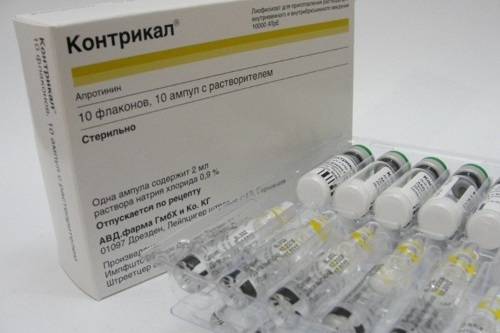
Contrikal in ampoules - Etamsilat allowed for use during pregnancy and breastfeeding. The tool contains the active ingredient of the same name, it is considered quite effective and helps to quickly eliminate bleeding. It is administered intramuscularly 2 ml 2-3 times a day for 10 days. Longer courses are shown as needed.
The use of medications during pregnancy and lactation should be agreed with your doctor.
List of the best drugs for heavy periods
Many women suffer from heavy periods, which cause blood complications as a result of severe blood loss. To reduce blood volume, it is allowed to use drugs in tablet form, which not so often provoke complications and are effective:
- Dicinon.
- Vikasol.
- Tranexam.
- Etamsilat.
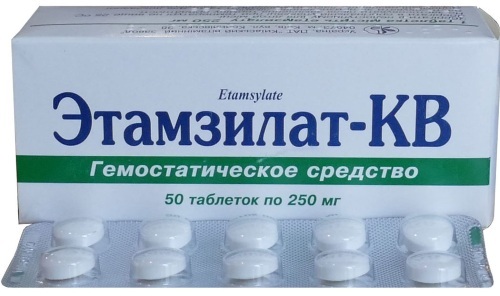
- Ascorutin.
Such funds additionally have a positive effect on the vascular wall, which helps to improve its condition and prevent complications. The drugs are usually taken 2-3 days before the onset of menstruation and continue to be used for 3 days after the end. The dosage for each patient is determined individually.
What can be used to stop nosebleeds?
Capillary bleeding, which includes nasal bleeding, is stopped by using a special hemostatic sponge. It is a dry, homogeneous compressed mass, which is in a sterile package. The size of each can be 50 × 50 mm or 100 × 100 mm.
After removing the sponge from the sterile bag, it should be inserted into the nasal passages. For 3 minutes, it is soaked in blood and adheres tightly to the mucous membranes, preventing further bleeding.
The tool is not used in courses, it is indicated only if necessary to provide emergency assistance to the patient with nosebleeds of various origins. It is recommended to visit a doctor after assistance.
Drugs designed to accelerate blood clotting are used quite often in various fields of medicine. They are effective, but if used incorrectly, they can provoke various complications. That is why it is important to first consult with a specialist who will determine the appropriateness of the appointment of a particular remedy.
Video about blood clotting drugs
Blood clotting drugs:

